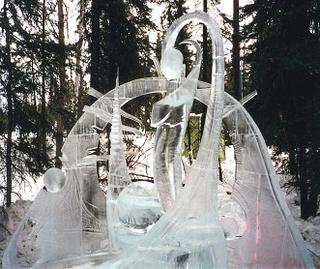

Madhav Nepal's UML is part of the seven party alliance. That alliance wants the 1999 parliament revived. Now Nepal is in news saying he will not accept it if the parliament were revived by the king using Article 127. This is meaningful.
"Political dialogue or round-table conference are the only alternatives that could reinstate the Parliament .... We will not accept the restoration of Parliament using Article 127 since such a parliament will face the situation like the one faced by Sher Bahadur Deuba.... We were not clear about constituent assembly earlier because we had hopes on the King .. But now, since the monarchy has sidelined the political parties we have opened our doors for constituent assembly.... The Maoists must stop attack on parties and accept multi-party democratic system if they are to
 be trusted."
be trusted."This has to be thought through.
This brings Madhav Nepal closer to my position. I have been for an interim government. Forget the 1999 parliament.
So if the 1999 parliament is to be revived, but it can not be done so using Article 127, then you are stepping outside of the constitution of 1990. There is no provision in the 1990 constitution for a roundtable conference. The very idea is to suggest the 1990 constitution is dead. Like the Panchayat constitution died in 1990.
And if the 1990 constitution is dead, the idea of reviving a parliament elected through the 1990 document makes no sense whatsoever. So instead you go straight for an interim government.
That reality has to be realized. The Nepali Congress is the second biggest roadblock towards that realization, the biggest being the king.
The king and the monarchists want to stick to the 1990 constitution, because its Article 127 reads like a constitution in its own right to the king. Article 127 gives him powers that Prithvi, and Tribhuvan, and Mahendra, and Birendra had, he thinks. And he likes that. He appointed Chand to become Prime Minister using Article 127, and then got his me
 n to get Chand to "request" a major increase in the royal budget and salaries. If the 1990 constitution stays on, that increase can not be corrected because, according to the 1990 constitution, allowances to the king may be increased, but they may not be decreased.
n to get Chand to "request" a major increase in the royal budget and salaries. If the 1990 constitution stays on, that increase can not be corrected because, according to the 1990 constitution, allowances to the king may be increased, but they may not be decreased.And so the king is the biggest impediment to coming to terms with the reality that the 1990 constitution is dead.
Why is the Nepali Congress the second biggest impediment? I can only guess. Maybe they think the 1990 document is the best they can come up with, and to pronounce it dead is to suggest they are an incompetent group of people, an argyment that could be marshalled many other ways. They think of the 1990 document as their "child." To pronounce it dead would be like killing your own child. There is that kind of bogus sentiment. That sentiment makes the Nepali Congress a near right wing party, a party that stands in the way of the social progress of the DaMaJaMa.
DaMaJaMa liberation totally hinges on pronouncing the 1990 document dead.
There are also other ulterior motives. If the 1999 parliament is revived, the Nepali Congress can "emerge" as the largest party in the country. That is not the ground reality any more. If a new constitution were to be drafted, and new elections held, the Nepali Congress will probably emerge as the third largest party in the country, if even that. The Maoists or the UML will likely emerge the largest party. And the Congress people don't like the idea, so they would rather go in denial, that the 1990 constitution, the 1999 parliament, and the Nepali Congress' position as the largest party in the country, they are all over. Gone!
I think the seven party alliance should work on a strategy that assumes the king will not comply. So what do you do? All seven parties should work on drafting a new constitution right now. And they should do so publicly. In a transparent manner. Differences and disagreements are okay. That is what the Constituent Assembly will be for. But it is high time the seven parties and the Maoits each proposed a draft constitution, and started talking to each other.
It is that difficult dialogue that takes place within a Constituent Assembly. That process can start now.
Or the seven parties and the Maoists could give themselves a wonderful starting point.
My Proposed Constitution.
Take a look at it, and say in a public, transparent manner if there are portions you disagree with.
If the seven parties and the Maoists could agree on a constitution now, that totally speeds things up. That clarity will topple the regime like nothing else.
It boild down to political dialogue. The key players need to be initiating dialogue, and holding relentless dialogue.
Power flows through political dialogue.
- Hold relentless, constant dialogue among all seven political parties.
- Invite the Maoists into that fold.
- All eight work on a draft constitution.
- Seek an interim government. Declare its formation unilaterally if you have to.
- Invite the Maoists into that governemnt after peace talks, after they have disarmed.
- Go for elections to a Constituent Assembly to iron out differences on the constitution that might still remain.
